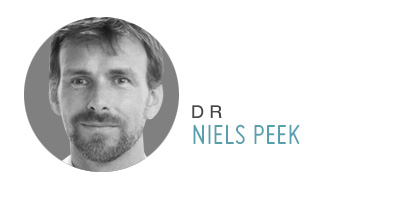
Dr. Niels Peek is Reader (Associate Professor) in Health Informatics at the MRC Health e-Research Centre, University of Manchester. With a background in Computer Science and Artificial Intelligence, his research focuses on data-driven informatics methods for healthcare quality improvement, data mining for healthcare, predictive models, and clinical computerised decision support. He is director of the Greater Manchester Connected Health City, which is part of the £20M “Health North” investment to establish a learning health system in the North of England. Dr. Peek has co-authored more than 150 peer-reviewed, scientific publications. He is the President of the European Society of Artificial Intelligence in Medicine, and co-chairs the Scientific Programme Committee of MEDINFO-2017, the 16th World Congress on Health and Biomedical Informatics.
How would you describe your and UoM’s involvement in the Innovate UK project with MUJO?
Our main contribution to the Innovate UK project was to develop a prototype portal that demonstrates the secondary use of data captured through the MuJo app. The portal that was developed shows how these data can be used to get a better understanding of the patient groups that use the MuJo fitness station, what they use it for, and what the frequency and intensity of use is. The portal includes a predictive model that estimates the expected outcome of shoulder rehabilitation for patients, based on their age, diagnosis, and treatment plan.
What benefits did you see from this project for yourself/UoM?
We believe that connected and digital health will be a major area of economic growth and healthcare innovation over the next decades. The opportunities that new digital technologies offer for health and care seem virtually infinite. However the challenge is to deploy these technologies in such a way that they lead to demonstrable improvements for patients and are economically systainable. The MuJo approach is an excellent example of this.
What do you think the project impacts are?
Muskuloskeletal disease is a common condition and has major societal implications. What the project demonstrates is that digital technologies can be used to improve service provision both directly (through the app) and indirectly by facilitating secondary analysis of data – which can lead to new knowledge.
What were the challenges / interesting bits about completing the work?
Health data that are routinely collected in clinical practice is messy, inaccurate, biased, and has many gaps. The data that are collected through the MuJo fitness app are no exception. This makes it very challenging to extract meaningful and reliable information from these data, e.g. to construct the predictive model.
Do you have any similar projects or recent work that this builds on or you can build from?
We have several ongoing and emerging collaboration with digital health companies (e.g. with SmartLife, a Manchester based company that develops smart garments) but in our opinion, the work that MuJo does is unique through its integration of multi-axial fitness stations and sensor technology.
What will you be able to bring to your other projects from completing this work?
The project has provided us with valuble experience in analysing routinely collected sensor data; has helped us with a getting a better understanding of the musculoskeletal domain; and has been an excellent example of a successful partnership between industry, academia and the NHS.
Tell us a bit about the conference?
Informatics for Health 2017 has brought together the 28th Medical Informatics Europe Conference (MIE2017) from the European Federation for Medical Informatics and the annual international conference of the UK’s national Farr Institute of Health Informatics Research. It was held in Manchester, UK, 22-26 April 2017 and was attended by more than 800 people from over 30 countries. The conference covered a broad range of topics in health information technology, data science, population health informatics, learning health systems, and connected health. These topics were addressed from the perspectives of patients, health professionals, service providers, and the public alike. The programme included pre-conference tutorials on 22-23 April 2017; three days of scientific sessions including plenary keynote lectures, paper and abstract presentations, panel discussions, workshops, software demonstations, and poster presentations; and an exhibition that featured a large variety of digital health companies, healthcare organisations, public sector organisations, and third sector organisations. This was complemented by a social programme that incuded a conference dinner at Manchester Cathedral, a “Science slam”, a theatre play on health data sharing, and guided tours of Manchester.
For more information visit http://informaticsforhealth.org.
One of the conference’s highlights was a demonstration of the portal and predictive model that we have developed as part of the Innovate UK project, led by Doug Higgins from MuJo and Richard Williams from the University of Manchester.
What future work are you planning with MUJO?
As director of the Greater Manchester Connected Health City I am involved in the various initiatives to transform care pathways in the region using data and digital technologies. Greater Manchester is particularly well placed to pilot innovative care pathway transformation methods through its devloved £6bn health and social care budget. One of these initiatives concerns a large “back-to-work” programme that aims to reduce absenteesm from work and long-term sickness, with muskuloskeletal disease as major focus area. We will explore opportunities to working with MuJo to deploy the technology to assess and treat patients in an out-of hospital setting in the community, potentially in a mobile clinic

